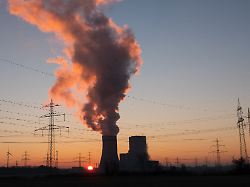Lack of power plant strategy
Industry does not believe in an earlier coal phase-out
December 23, 2023, 7:16 a.m
Listen to article
This audio version was artificially generated. More info | Send feedback
By 2030, 80 percent of Germany’s electricity should come from renewable sources, according to the coalition agreement. The Federal Association of German Industry considers the project to be unrealistic. Sufficient reserve capacity is needed for the exit – and it doesn’t exist.
The industry sees little chance of an early phase-out of coal in Germany. Industry President Siegfried Russwurm cited the lack of a strategy from Federal Economics and Climate Protection Minister Robert Habeck about incentives for building new gas power plants as the reason. “It is extremely annoying that we could find ourselves in the situation of having to continue operating coal-fired power plants for longer because there are no sufficient other reserve capacities.”
When restructuring the electricity system, the federal government is relying on renewable energies from wind and sun. The goal is for 80 percent of the electricity consumed in Germany to come from renewable sources by 2030. Currently it is just over half.
Power plant strategy is missing
Companies have been waiting for a power plant strategy from Habeck for a long time, which was actually supposed to be presented in the summer. New gas power plants are supposed to step in as a “backup” in “dark lulls” – when there is no wind and no sun shining – to cover electricity demand. They will initially be operated with natural gas and later with climate-neutral hydrogen. However, energy companies have so far been reluctant to invest because the new power plants are not yet profitable.
Habeck had announced state funding worth billions. An incentive system is possible that rewards operators for maintaining power plant capacity. However, according to a ruling by the Federal Constitutional Court, the federal government must plug billions in holes in the budget for 2024 and in the climate and transformation fund.
“It will take private sector investments, and they have to be worthwhile – even with just a few operating hours per year,” said Russwurm. “I’m a fan of adding renewables. But it’s fair to say that you need reserves for the dark doldrums. We’re a long way from having sufficient storage capacity.” Sufficient hydrogen-capable gas power plants are a thing of the future.
Government under criticism
“When announcing its power plant strategy, the federal government assumed that in times when electricity is scarce in our country, we can import significant quantities from abroad and that we therefore only need to build 25 gigawatts,” said the President of the Federation of German Industries. “This is a highly optimistic thesis because it assumes that our neighbors always have excess electricity when we need it. But 25 gigawatts of additional power also means 50 new power plants.” This is an immense ambition.
“To the extent that this expansion does not succeed, the Federal Network Agency will have little choice in order to maintain security of supply than to keep coal-fired power plants connected to the network,” said Russwurm. “And electric cars that run on electricity from coal-fired power plants would really be a serious setback for climate protection.”
Russwurm believes that an earlier phase-out of coal is almost no longer possible
The traffic light coalition had agreed to “ideally” bring forward the coal phase-out to 2030 in order to prevent the emission of climate-damaging carbon dioxide. So far, an eight-year phase-out has only been decided in the Rhenish district. It is controversial in the areas of East Germany.
When asked whether he still saw a chance of phasing out coal in 2030, the BDI President said: “Honestly, I don’t have the imagination for it.” It is hardly conceivable to build 50 gas power plants at the same time in just a few years. There are only a few manufacturers who are able to produce hydrogen-capable gas turbines, and this is neither easy nor inexpensive. “If 50 are to be ordered, planned, approved and built at the same time in Germany alone, that is an objective that does not seem very realistic to me.”
